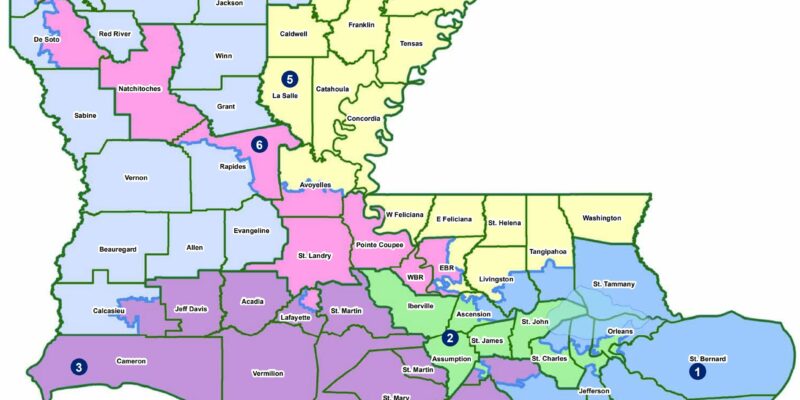(By Victor Skinner/The Center Square) — A dozen “non-African American” voters are suing the state over new congressional districts crafted last month they claim violate their constitutional rights.
“The State has engaged in explicit, racial segregation of voters and intentional discrimination against voters based on race,” plaintiffs wrote in the lawsuit filed Wednesday in U.S. District Court. “The State has drawn lines between neighbors and divided communities. In most cases, the lines separate African American and non-African American voters from their communities and assign them to Districts with dominating populations far away.”
Lawmakers adopted Senate Bill 8, sponsored by Sen. Glen Womack, R-Madisonville, during a five-day extraordinary session called by Gov. Jeff Landry to address a court order from U.S. District Judge Shelly Dick, an appointee of former President Barack Obama, to redraw the state’s congressional districts by Jan. 31.
The order stemmed from the case Robinson v. Landry, which alleged congressional districts in the prior redistricting map did not sufficiently represent Black voters with one Black majority district out of six. Dick sided with plaintiffs and ordered new districts, while an appeals court and U.S. Supreme Court declined to review the case.
Plaintiffs in the lawsuit filed Wednesday contend the focus during the extraordinary session violates their civil rights outlined in the 14th and 15th Amendments of the U.S. Constitution.
“From start to finish the State’s purpose was clear: segregate voters based entirely on their races and create two majority-African American voting districts and four majority non-African American districts, without regard for any traditional redistricting criteria,” the filing read.
“SB 8’s sponsors and many other lawmakers expressly stated their intent was to maximize the voting strength of African American voters by stripping them from their communities in far-flung regions of Louisiana and consolidating them into two districts that stretched hundreds of miles in length and dwindled to less than a mile in width,” it continued. “In doing so, the State engaged in textbook racial gerrymandering and violated the U.S. Constitution.”
The lawsuit notes a “remarkably similar” map at the center of Hays v. Louisiana was struck down in the courts as an unconstitutional racial gerrymander in the 1990s.
Advertisement
“Hays v. Louisiana presents us with what we in Louisiana call a ‘Goose’ case, meaning it is almost factually identical to the case before this Court today,” plaintiffs wrote. “Only here, the facts are far worse for the state.”
Womack said during the recent session his focus with SB 8 was to protect Republican U.S. House Speaker Mike Johnson, House Majority Leader Steve Scalise, and Republican Congresswoman Julia Letlow, the only woman in the congressional delegation and Womack’s representative.
The map puts Republican U.S. Rep. Garrett Graves in political peril, and he’s spoken out in recent weeks about his doubts the map can withstand a legal challenge. While Landry insisted the state exhausted all legal options and risked having an Obama-appointed judge craft new districts if lawmakers failed to act, Johnson urged the state to proceed to a trial in Robinson v. Landry that was slated for February.
Johnson posted to X “There are multiple other map options that are legally compliant and do not require the unnecessary surrender of a Republican seat in Congress.”
Jared Evans, senior policy counsel for the NAACP Legal Defense Fund representing plaintiffs in Robinson v. Landry, celebrated the passage of SB 8 last month, suggesting it “will finally provide Black voters with a true opportunity to elect their candidates of choice in two congressional districts.”
Advertisement
Advertisement

